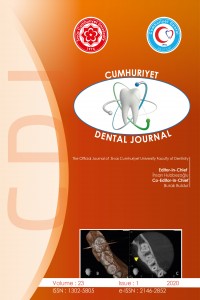Abstract
References
- Socransky SS, Haffajee AD. Periodontal microbial ecology. Periodontol 2000 2005;38, 135-187.
Abstract
Objectives:
The purpose of this study is to compare the
clinical, antibacterial and microbiological effects of the non-fluoride and
fluoride toothpastes.
Materials and Methods: In
this study eighty children (3 to 12 years old) were divided into four groups
and followed for four weeks. First and second groups (40 children, 6-12 years)
used different fluoride toothpastes; third and fourth groups (40 children, 3-5
years) used nonfluoride toothpastes. The halitosis score,
plaque index, gingival index, bleeding index, buffering capacities,
Mutans Streptococci, Lactobacilli and
yeast counts were recorded on 1st day, 7th
day, 15th day and 30th day. First and second
group; third and fourth group were compared with each other. Data were analyzed
statistically by using Mann Whitney U tests, Wilcoxon Sign Test, Fisher Freeman
Halton Exact Test and Mc Nemar Test with a significance level of p<0.05.
Results:
Statistically significant association was not found in the mean scores of
halitosis, gingival index, plaque index, bleeding index, buffering capacity, Mutans Streptococci, Lactobacilli and
yeast (p>0.05), between groups on first day. All four
toothpastes produced statistically significant reductions from 1st day to 30th
days in scores of halitosis, plaque index, gingival index, bleeding index and buffering
capacity (p<0.01; p<0.05), within groups. Statistically significant
reductions was found according to in Mutans Streptococci, counts
from 1st day to 30th day for group 1, 2 and 3 (p<0.05); but was not found
statistically significant changes in group 4 on the 30th days(p>0.05).
Conclusion:
All tested toothpastes proved to be safe and
significantly effective clinical and microbiological features.
Keywords
References
- Socransky SS, Haffajee AD. Periodontal microbial ecology. Periodontol 2000 2005;38, 135-187.
Details
| Primary Language | English |
|---|---|
| Subjects | Health Care Administration |
| Journal Section | Original Research Articles |
| Authors | |
| Publication Date | March 18, 2020 |
| Submission Date | September 25, 2019 |
| Published in Issue | Year 2020 Volume: 23 Issue: 1 |
Cited By
EFFECTS OF NANO-HYDROXYAPATITE DENTIFRICES WITH AND WITHOUT FLUORIDE ON PRIMARY TEETH ENAMEL: A MICRO-CT AND A SEM STUDY
Cumhuriyet Dental Journal
Cansu KOÇYİĞİT
https://doi.org/10.7126/cumudj.738837
Cumhuriyet Dental Journal (Cumhuriyet Dent J, CDJ) is the official publication of Cumhuriyet University Faculty of Dentistry. CDJ is an international journal dedicated to the latest advancement of dentistry. The aim of this journal is to provide a platform for scientists and academicians all over the world to promote, share, and discuss various new issues and developments in different areas of dentistry. First issue of the Journal of Cumhuriyet University Faculty of Dentistry was published in 1998. In 2010, journal's name was changed as Cumhuriyet Dental Journal. Journal’s publication language is English.
CDJ accepts articles in English. Submitting a paper to CDJ is free of charges. In addition, CDJ has not have article processing charges.
Frequency: Four times a year (March, June, September, and December)
IMPORTANT NOTICE
All users of Cumhuriyet Dental Journal should visit to their user's home page through the "https://dergipark.org.tr/tr/user" " or "https://dergipark.org.tr/en/user" links to update their incomplete information shown in blue or yellow warnings and update their e-mail addresses and information to the DergiPark system. Otherwise, the e-mails from the journal will not be seen or fall into the SPAM folder. Please fill in all missing part in the relevant field.
Please visit journal's AUTHOR GUIDELINE to see revised policy and submission rules to be held since 2020.

